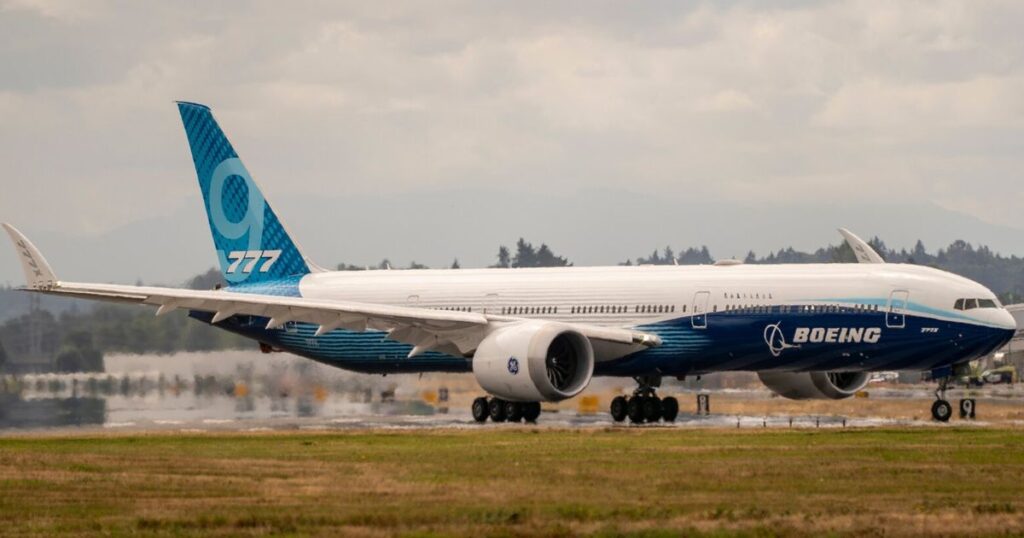(Bloomberg) — Boeing Co. announced a $4.9 billion accounting charge and delayed debut for its 777X jetliner, a reminder of the long recovery ahead for the US planemaker even as rising aircraft deliveries bolster its cash.
The non-cash writedown, which was previously reported by Bloomberg News, overshadowed third-quarter earnings, with a $7.47 loss per share that was wider than the $4.44 deficit predicted by analysts. Revenue of $23.3 billion beat estimates.
The planemaker has now recorded almost $16 billion in total charges for the 777X, a strategically important aircraft that is running seven years behind schedule amid tough regulatory scrutiny and is now scheduled to enter service in 2027. The latest charge shows how Chief Executive Officer Kelly Ortberg still faces multiple challenges to stabilize the company, even as Boeing benefits from surging aircraft orders with support from the Trump administration.
The latest schedule slip reflects the slow pace of the latter stages of the certification process. While some analysts questioned why Boeing recorded such a large accounting loss for a delay of a year or less, Ortberg said the company wanted to ensure it had captured the risks in a process not fully within its control.
“What we wanted to do was make sure this isn’t a quarterly thing for us,” Ortberg said during an interview on CNBC, adding that the company is confident in its latest action plan.
Shares fell as much as 4.2% in New York trading. Boeing has outperformed the Dow Jones Industrial Average so far this year.
Ortberg also said he’s hopeful that Boeing will eventually reap orders as President Donald Trump meets Chinese President Xi Jinping on Thursday. The planemaker hasn’t booked a major aircraft deal from China since 2017.
The better-than-expected revenue and free cash flow in the quarter underscores the steady improvement to the 737 and 787 Dreamliner production this year. That’s a break from the costly delays and quality lapses on the two models that have frustrated customers and weighed on its finances for a half-decade.
The company generated free cash flow of $238 million during the quarter, a feat it last accomplished in the final months of 2023. Boeing was forced to raise cash last year, following a near-catastrophic accident in the first days of 2024 that threw its production into disarray and led to a change in senior management.
Analysts had expected the planemaker to burn through $884.1 million in cash before attaining positive cash flow during the fourth quarter.
The 777X is an updated version of Boeing’s popular 777 model, the company’s largest civil aircraft in production. Airbus SE, which also reports earnings later on Wednesday, competes with its A350 plane.
Boeing’s general recovery remains “intact and the supply-chain backdrop is probably improving — although you always worry when you say that about Boeing,” said George Ferguson, an analyst with Bloomberg Intelligence.
The US planemaker delivered 160 aircraft during the quarter, the most since 2018, and the pace should continue rising as Boeing boosts 737 production by 10% to the higher rate recently approved by US regulators. The step-up in the factory pace hasn’t yet fully been implemented, Ortberg told employees.
While the latest 777X delay is disappointing, the airplane continues to perform well in flight-testing and doesn’t have any technical issues, Ortberg said. The company is making progress toward certifying its last two 737 Max models after deciding on a design to address an engine anti-ice issue, he told CNBC.
(Updates throughout with shares, CEO comments on CNBC.)
More stories like this are available on bloomberg.com
©2025 Bloomberg L.P.

